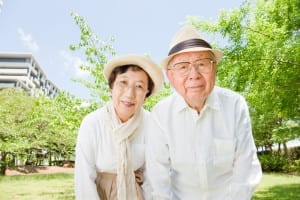 “You have decided the length of our lives. You know how many months we will live, and we are not given a minute longer” (Job 14:5, NLT).
“You have decided the length of our lives. You know how many months we will live, and we are not given a minute longer” (Job 14:5, NLT).
As Christians, we know that God has appointed our days. However, it is fascinating to study cultures such as the Okinawans, inhabitants of a coral ringed island south of Japan and north of Taiwan. Once an independent kingdom, Okinawa was forcibly assimilated into Japan in the late 1800s during one of the worst battles of World War II. Today it is the poorest of all Japan’s provinces, but Okinawa’s health figures are impressive. Known for their many centenarians, there are 34 centenarians for every 100,000 people, as compared to 10 to every 100,000 in the US. Not only do these people have the potential to live longer than us in the West, but their quality of life is also greater as they age. While Americans are also increasing in longevity, this is often due to medication while improvement in quality of life is often severely lacking.
A study of Okinawans
A study was done of 900 centenarian Okinawans which found that their arteries were impressively young and clean, and they had far lower cholesterol and homocysteine levels compared to a Westerner. This reduced their risk of coronary heart disease by 80 percent and kept stroke levels low. They were also at low risk for hormone-dependent cancers and had an 80 percent less likelihood of developing breast and prostate cancer, and were 50 percent less likely to succumb to ovarian or colon cancer. Unfortunately a recent study of obese American children aged 6-19, showed that many had the inflamed arteries of a 45-year-old. Doctors were considering putting many of them on statins because of their unwillingness to adopt a healthy diet.
The Okinawan study showed that about one-third of the human life span was determined genetically, but that diet and lifestyle played a significant role. The Okinawan diet is very low in calorie intake and high in fruits and vegetables. These fruits and vegetables are either picked and eaten immediately, lightly steamed or pickled. Their diet is also high in Omega 3, from raw fish, and fiber and soy isoflavones, which slow bone loss. Okinawans have very low body fat (body mass between 18-22) and are extremely physically active, growing and reaping their own foods. They practice only eating until they are 80 percent full. Okinawans adopt a stress-minimizing outlook and live together in village communities where they share physical work, joy and hardship. Whereas the Western culture tends to idolize youth, there is a deep respect for age in the Okinawan culture, which means that people, rather than dreading old age, look forward with anticipation to the latter season of their life.
Henry Ward Beecher said, “I think you might dispense with half your doctors if you would consult Dr Sun more.” Indeed, the Okinawans spend most of their time outside, cultivating their crops, harvesting, hiking and getting ample Vitamin D, which has been shown to prevent many diseases. They have a health care system that is inexpensive and promotes prevention. In spite of their sun exposure, skin cancer is virtually unheard of, possibly because their bodies do not contain high levels of toxins. The Okinawans breath fresh ocean air, unlike their Western counterparts, most of whom spend the much of their time inside, with artificial light and air-conditioning or heating.
Lifestyle changes
Interestingly, 100,000 Okinawans moved to Brazil in the last century, and it was noted that their life span decreased there by around 17 years. Their lifestyles changed as they began consuming meat, exercising less, living independent, higher stressed lives, and no longer growing healthy, organic food, but eating processed foods, high in sugar, salt and additives.
It would seem that longevity may be achieved by:
-Eating a mostly vegan, organic diet with minimal animal products and fat.
– Getting adequate levels of Vitamin D and daily exercise.
-Being part of a strong community for support physically, emotionally and spiritually.
-Living a low-stress lifestyle.
-Having a sense of purpose and receiving respect.
Andrea Goff hosts Choosing Joy, a support group for people dealing with ongoing medical conditions, pain, anxiety or depression. For information, contact [email protected].

Comments